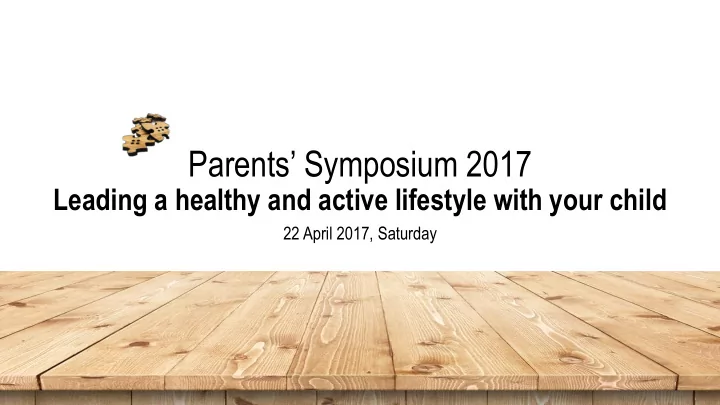

Parents’ Symposium 2017 Leading a healthy and active lifestyle with your child 22 April 2017, Saturday
Leading a healthy and active lifestyle with your child 3 areas of concern to a healthy lifestyle • Physical Activity – Play • Diet – Eat • Rest – Sleep
Parents’ Symposium 2017 Why Play With a Child? multiple benefits for children when they play including physical, mental and social health. Play helps children develop all sorts of skills. • Special Benefits of Parent-Child Play versus Play with Siblings • Differences in Play with Mother and Play with Father • Health Benefits for the Parent https://www.psychologytoday.com/blog/moral-landscapes/201404/why-play-child
Useful URLs Parents’ Symposium 2017 • 50 Fun & Free Things To Do In Singapore - TheSmartLocal • http://thesmartlocal.com/read/free-things-to-do • Public Advisories on Encounters with Wild Animals • http://www.ava.gov.sg/explore-by-sections/pets-and-animals/wildlife-and-endangered- animals/public-advisories-on-encounters-with-wild-animals • Gardens, Parks and Nature • https://www.nparks.gov.sg/gardens-parks-and-nature/parks-and-nature-reserves/sisters-islands- marine-park • Things to do in Singapore with kids: 27 fun activities for the entire family • http://thehoneycombers.com/singapore/things-to-do-with-kids-family-fun/ • Trails – Embark on a trail today and discover heritage places around you. • https://roots.sg/visit/trails
Useful URLs Parents’ Symposium 2017 • Active Family – Health Promotion Board • https://www.healthhub.sg/programmes/109/active-family • Parent and child workout • https://www.youtube.com/results?search_query=parent+and+child+ workout • March school holidays 2017: kid friendly activities By Lynn Wee — March 20, 2017 • http://www.youngparents.com.sg/family/march-school-holidays- 2017-kid-friendly-activities/?slide=14
Parents’ Symposium 2017 Nutrition Studies that support link between nutrition and academic performance nutrition affects students’ thinking skills, behavior, and health, all factors that impact academic performance. diets high in trans and saturated fats can negatively impact learning and memory, nutritional deficiencies early in life can affect the cognitive development of school-aged children, and access to nutrition improves students’ cognition, concentration, and energy levels.
Parents’ Symposium 2017 • one study found that 5th grade students with less nutritious diets performed worse on a standardized literary assessment (Florence, Asbridge, & Veugelers, 2008) • 5th grade students who ate more fast food fared worse on math and reading scores (Li & O’Connell, 2012) • banned junk food from schools and introduced healthier, freshly prepared school meals found that participating students scored higher on English and science tests than students who did not take part in the campaign (Belot & James, 2009)
Parents’ Symposium 2017 • Nutrition also indirectly impacts school performance. Poor nutrition can leave students’ susceptible to illness or lead to headaches and stomachaches, resulting in school absences (Brown, Beardslee, & Prothrow-Stith, 2008) • Access to nutrition that incorporates protein, carbohydrates, and glucose has been shown to improve students’ cognition, concentration, and energy levels (Bellisle, 2004; Sorhaindo & Feinstein, 2006) • Research has also established a link between nutrition and behavior. Studies have found that access to nutrition, particularly breakfast, can enhance a student’s psychosocial well -being, reduce aggression and school suspensions, and decrease discipline problems (Brown et al., 2008)
Parents’ Symposium 2017 What to feed your child? • Breakfast is important (http://www.npr.org/templates/story/story.php?storyId=5738848) (some scientific terms) The glycemic index is a measure of how quickly the carbohydrates in food are absorbed into our bodies and converted to fuel. When it comes to sustained brain power, food that is low on the scale — such as whole grains — are preferable. Even though a bowl of sugary cereal and a bowl of old-fashioned oatmeal may have the same number of carbohydrates, they have very different glycemic loads. • eat in accordance with healthy plate (see link below) (https://www.hsph.harvard.edu/nutritionsource/healthy-eating-plate/)
Adequate rest Parents’ Symposium 2017 • Fixed a standard bedtime • Adhere to it • Fixed a standard wakeup time • Adhere to it Average person needs 7 to 8 hours of rest/sleep Children needs 9 to 11 hours of rest/sleep Failure to meet the above may result in Children : Affect learning ability -> poor academic performances Adult : Not alert -> poor decisions All : lower immune system -> susceptible to viruses and diseases
Parents’ Symposium 2017 THE END Prepared by : PE Department Presented by : Mr Raphael John Yeong Cheng Yue
Parents’ Symposium 2017 https://tinyurl.com/rmps2017 Prepared by : PE Department Presented by : Mr Raphael John Yeong Cheng Yue
Recommend
More recommend